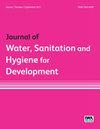加纳基础学校的水、环境卫生和个人卫生状况:来自Wa市的经验证据
IF 1.4
4区 环境科学与生态学
Q3 WATER RESOURCES
Journal of Water Sanitation and Hygiene for Development
Pub Date : 2023-02-21
DOI:10.2166/washdev.2023.164
引用次数: 0
摘要
获得功能性的水、环境卫生和个人卫生系统是安全健康的必要条件,也是人类福祉的基本决定因素。因此,不断监测、跟踪和缩小在获得讲卫生运动方面的差距是一项全球公共卫生要求。发展中国家目前在2019冠状病毒病暴发的时代处于不利地位,特别是在以学校为基础的WaSH领域。本研究评估了Wa市妨碍以学校为基础的WaSH服务的现状和挑战。145名卫生教师的主要数据是通过问卷调查和视力评估获得的。结果表明,佤市的基础学校目前已经具备了某种形式的WaSH设施,因此在很大程度上满足了可得性标准。然而,这些学校没有达到其他标准——功能、可达性、维护和服务质量、教育和实践。影响以学校为基础的WaSH可持续运作的主要因素是WaSH基础设施的维护不善和资金不足。如果要实现到2030年实现可持续发展目标6的目标,加纳以学校为基础的讲卫生运动需要得到密切的政策关注。本文章由计算机程序翻译,如有差异,请以英文原文为准。
Condition of water, sanitation and hygiene (WaSH) in Ghana's basic schools: empirical evidence from Wa municipality
Access to functional water, sanitation and hygiene (WaSH) systems is a necessity for safe health and a fundamental determinant of human well-being. As a result, constant monitoring, tracking and bridging of the gaps in access to WaSH is a global public health requirement. Developing countries are currently disadvantaged in this era of the COVID-19 outbreak, particularly in the area of school-based WaSH. This study assesses the present condition and challenges hindering access to school-based WaSH in the Wa Municipality. Primary data involving 145 health teachers were sourced using survey questionnaires and supported with ocular assessment. Results show that basic schools in the Wa Municipality currently have in place some sort of WaSH facilities, thereby meeting the availability criteria to a large extent. However, these schools do not meet the remaining standards – functionality, accessibility, maintenance and quality of services, education and practices. The major factors affecting the sustainable operationalisation of the school-based WaSH are poor maintenance and inadequate funding of WaSH infrastructure. The school-based WaSH in Ghana requires rapt policy attention if the quest to attain Sustainable Development Goal 6 by 2030 is to be achieved.
求助全文
通过发布文献求助,成功后即可免费获取论文全文。
去求助
来源期刊

Journal of Water Sanitation and Hygiene for Development
WATER RESOURCES-
CiteScore
3.10
自引率
11.80%
发文量
58
审稿时长
16 weeks
期刊介绍:
The Journal of Water, Sanitation and Hygiene for Development is a peer-reviewed journal devoted to the dissemination of high-quality information on the science, policy and practice of drinking-water supply, sanitation and hygiene at local, national and international levels.
 求助内容:
求助内容: 应助结果提醒方式:
应助结果提醒方式:


